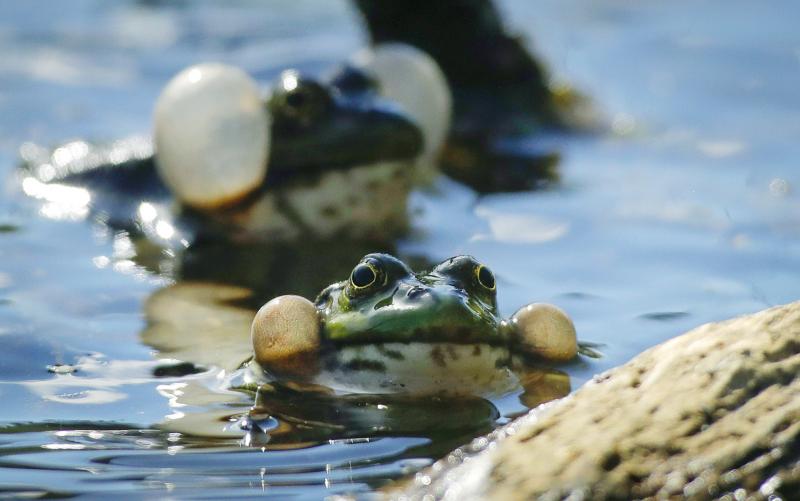It is not as bad as suggesting injections of disinfectant. Isaac Newton’s 17th-century prescription for plague — which blended powdered toad with toad vomit to form “lozenges” to drive away the contagion — has been revealed.
Two unpublished pages of Newton’s notes on Jan Baptist van Helmont’s 1667 book on plague, De Peste, are to be auctioned online by Bonham’s this week. Newton had been a student at Trinity College, Cambridge, when the university closed as a precaution against the bubonic plague, which killed 100,000 people in London in 1665 and 1666.
When the polymath returned to Cambridge in 1667, he began to study the work of Van Helmont. Newton’s analysis of De Peste is the most substantial written statement he is known to have made about the plague, according to Bonhams, who said the papers were of “profound importance to the Newton body of work, as well as deeply meaningful within the present context.”

Photo: AP
The auction house’s books specialist, Darren Sutherland, said: “Newton’s running notes represent the only significant writings on the subject by the world’s greatest scientific mind that we have been able to trace. A timely reminder, perhaps, that there is nothing new under the sun.”
The notes include the case of a man who touched “pestilent papers, immediately felt a pain like a pricking needle and developed a pestilent ulcer in the forefinger, and died in two days,” and his observation that “places infected with the plague are to be avoided.”
Some of Newton’s potential cures recorded are unlikely to be taken up today, however. He writes that “the best is a toad suspended by the legs in a chimney for three days, which at last vomited up earth with various insects in it, on to a dish of yellow wax, and shortly after died. Combining powdered toad with the excretions and serum made into lozenges and worn about the affected area drove away the contagion and drew out the poison.”
Van Helmont, a renowned physician, had been a practicing doctor in Antwerp when the city was hit by plague in 1605.
Despite Newton’s standing, the papers have never previously been included in any collected works. When Newton died in 1727, his huge archive was left to his niece, Catherine Conduitt. It remained in the family until 1872, when his descendant, Isaac Newton Wallop, Fifth Earl of Portsmouth, donated his writings to Trinity College.
Cambridge kept only the mathematical and scientific papers and returned Newton’s more controversial writings on alchemy, theology and philosophy. These papers, including Newton’s notes on Van Helmont, were sold in 1936 to private collectors, among them John Maynard Keynes.
“There was never much interest in his ‘other’ writings until recently,” said Sutherland. “So it really is a case of cometh the hour, cometh the man — with his remedies to ward off a virus that’s causing a pandemic.”
The pages will be auctioned by Bonhams for an estimate of US$80,000 to US$120,000 as part of its online-only Essential Genius: Ten Important Manuscripts sale, which runs until 10 June. The auction also includes an autographed and signed draft of the last lines of Walt Whitman’s final poem, A Thought of Columbus.

Under pressure, President William Lai (賴清德) has enacted his first cabinet reshuffle. Whether it will be enough to staunch the bleeding remains to be seen. Cabinet members in the Executive Yuan almost always end up as sacrificial lambs, especially those appointed early in a president’s term. When presidents are under pressure, the cabinet is reshuffled. This is not unique to any party or president; this is the custom. This is the case in many democracies, especially parliamentary ones. In Taiwan, constitutionally the president presides over the heads of the five branches of government, each of which is confusingly translated as “president”

Sept. 1 to Sept. 7 In 1899, Kozaburo Hirai became the first documented Japanese to wed a Taiwanese under colonial rule. The soldier was partly motivated by the government’s policy of assimilating the Taiwanese population through intermarriage. While his friends and family disapproved and even mocked him, the marriage endured. By 1930, when his story appeared in Tales of Virtuous Deeds in Taiwan, Hirai had settled in his wife’s rural Changhua hometown, farming the land and integrating into local society. Similarly, Aiko Fujii, who married into the prominent Wufeng Lin Family (霧峰林家) in 1927, quickly learned Hoklo (commonly known as Taiwanese) and

The low voter turnout for the referendum on Aug. 23 shows that many Taiwanese are apathetic about nuclear energy, but there are long-term energy stakes involved that the public needs to grasp Taiwan faces an energy trilemma: soaring AI-driven demand, pressure to cut carbon and reliance on fragile fuel imports. But the nuclear referendum on Aug. 23 showed how little this registered with voters, many of whom neither see the long game nor grasp the stakes. Volunteer referendum worker Vivian Chen (陳薇安) put it bluntly: “I’ve seen many people asking what they’re voting for when they arrive to vote. They cast their vote without even doing any research.” Imagine Taiwanese voters invited to a poker table. The bet looked simple — yes or no — yet most never showed. More than two-thirds of those

In the run-up to the referendum on re-opening Pingtung County’s Ma-anshan Nuclear Power Plant last month, the media inundated us with explainers. A favorite factoid of the international media, endlessly recycled, was that Taiwan has no energy reserves for a blockade, thus necessitating re-opening the nuclear plants. As presented by the Chinese-language CommonWealth Magazine, it runs: “According to the US Department of Commerce International Trade Administration, 97.73 percent of Taiwan’s energy is imported, and estimates are that Taiwan has only 11 days of reserves available in the event of a blockade.” This factoid is not an outright lie — that